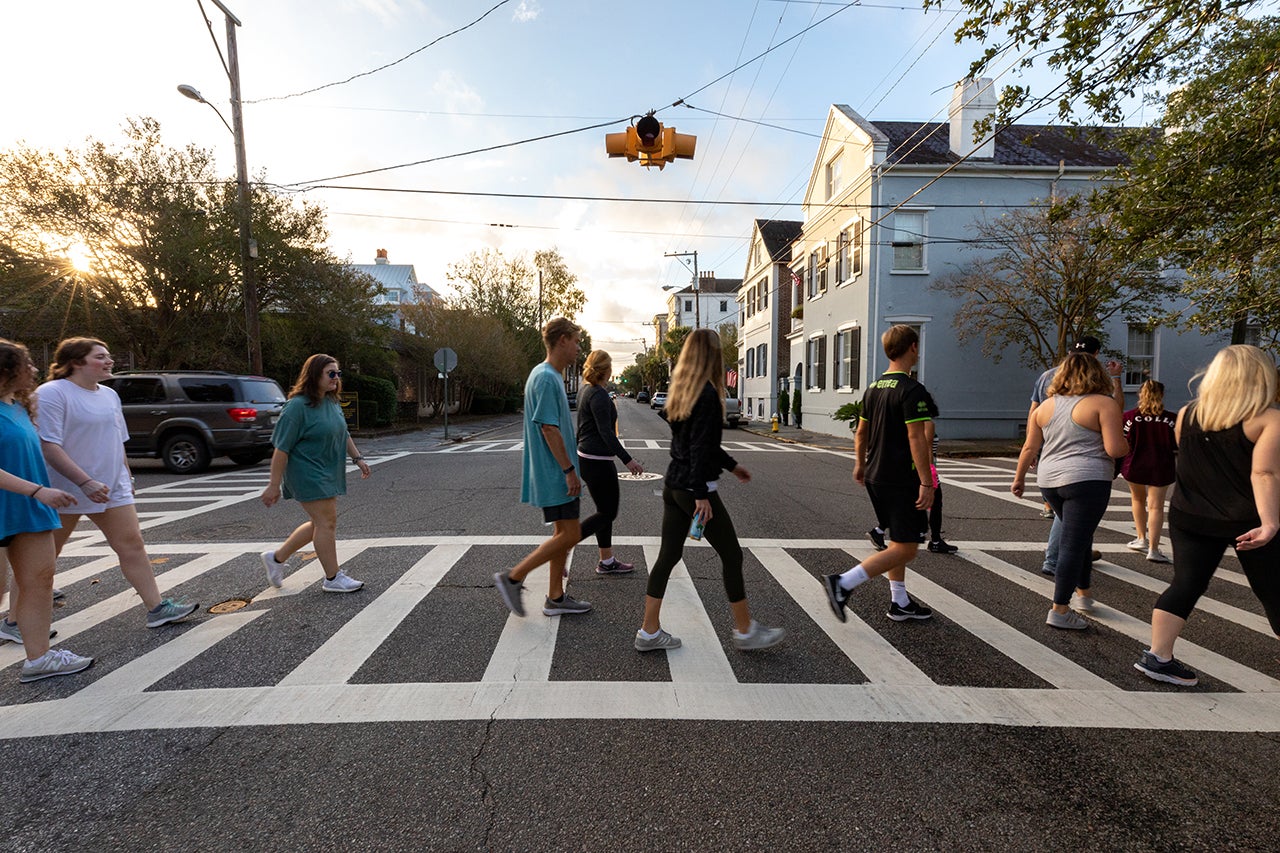
This is the second year Michael Tornifolio (center, in blue) has taught the Walk Yourself to Health course. (Photos by Heather Moran)
Michael Tornifolio thinks of himself as a lot like Mr. Miyagi – at least when it comes to teaching the students in his Walk Yourself to Health course.
“The Karate Kid thinks Mr. Miyagi is just coaching him in karate, but he’s really teaching him how to be a stronger, more confident, more aware person – hidden lessons he’ll use for life. It’s not about the karate,” says the College of Charleston’s associate cross country/track and field coach, noting that this is the second year he has taught this for-credit health and human performance class. “Students think they’re signing up to walk around town, but I’m Miyagi-ing them into being healthier physically, mentally, emotionally – and just being better students all around.”
To be fair, strolling through this class is kind of the requirement: Each student must lead a walk around Charleston for one class of the semester, and they’re graded on participation.
Like with so many things in life, says Tornifolio, “You’ve got to show up.”
You’ve also got to write a final paper about the short-term and long-term benefits of walking.
“Short-term effects like stress relief, accelerated productivity, getting your blood flowing a little bit – just decompressing – you’ll notice that immediately,” says Tornifolio. “But in the long term, walking improves your general fitness level. It builds on itself. Walking leads to jogging, and then you’re jogging every day, and then you’re running. You’ve got to learn to walk before you run.”
That’s the idea behind the course – just to get students who otherwise might not have a fitness routine moving.
“We want to provide our students opportunities to move, but we also want to educate them on the importance of lifetime physical activity,” says Tom Carroll ’91, associate chair of the Department of Health and Human Performance and director of its Physical Education Courses (PEAC) program, which offers classes like Tai Chi, stand-up paddle boarding, beginning surfing, running and resistance training. “Allowing students time during the school week to enhance fitness, acquire knowledge related to lifelong health and develop healthy habits directly benefits our students now and has the potential to positively affect them their entire lives.
“It’s an opportunity to get them involved in health and fitness – a foundation to getting healthier,” adds Tornifolio. “That’s why we wanted to focus on walking. Walking isn’t intimidating – we can all do it. When it comes to fitness, it’s easy to want to jump right in and go full throttle, but that’s why people don’t stick with it. The goal is that they learn that fitness doesn’t have to be painful or inconvenient. You’ve just got to start slow, and walking is a great way to do that.”
Carroll has been so pleased with the course that he has submitted it to go through the curricular process to be a permanent offering titled PEAC 170: Walking for Fitness & Health.
“Walking is one of the best forms of exercise and allows students of all abilities to meet the recommended amounts of physical activity to obtain measurable gains in fitness,” says Carroll.
It’s also a great way to get away from the stresses of college life, talk to new people and just explore their surroundings – which is why the students are not allowed to bring their phones on the walks.
“They’re learning to communicate with other people that they might not otherwise know. They make friends outside of their major, outside of their residence hall. And they’re learning that it’s important to take time for yourself,” he says. “I just want them to unplug and look around them – really take in everything about where we live.”
That’s why the 40-45–minute walks don’t have any real route or destination.
“We just explore Charleston and get to know the city a little bit more,” says Tornifolio. “I tell them, ‘I don’t want you to plan or stress about destination or mileage or anything. Just go wherever your feet take you.’”
It’s just the kind of thing Mr. Miyagi would say.





